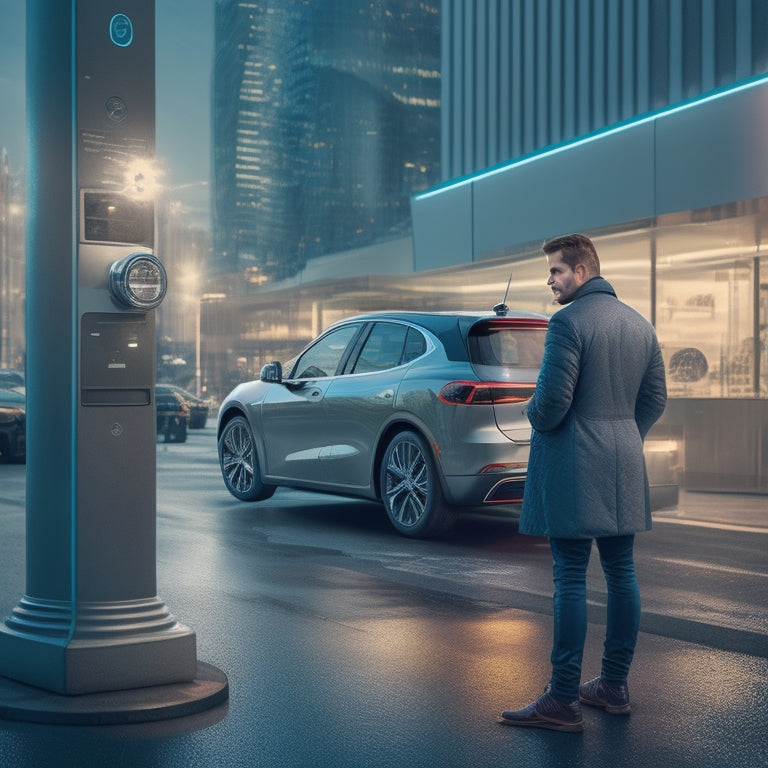
EV Charger Savings: Government Rebates and Incentives Explained
Share
You're eligible for significant savings when installing an EV charger, thanks to a range of government rebates and incentives designed to promote electric vehicle adoption and reduce greenhouse gas emissions. At the federal level, you can benefit from up to 30% tax credit for charger installation through the Alternative Fuel Vehicle Refueling Property Credit. Additionally, state and local governments offer rebates ranging from $500 to $4,000, while utility companies provide discounts through time-of-use rates, special EV tariffs, and demand response programs. Now that you know the basics, you can investigate further to maximize your EV charger savings.
Key Takeaways
- The federal government offers up to 30% tax credit for EV charger installation through the Alternative Fuel Vehicle Refueling Property Credit.
- State and local rebate programs, such as those in California, New York, and Texas, provide additional incentives for EV charger installations.
- Utility company discounts, like time-of-use rates and special EV tariffs, can further reduce charging costs for EV owners.
- EV charger tax credits are available for up to 30% of installation costs, with a maximum of $1,000 for individuals and up to $40,000 for businesses.
- To claim rebates, gather necessary documents, research available incentives, and follow the application process on government websites.
Federal EV Charger Incentives
Investigate the federal EV charger incentives that can help you offset the cost of installing an electric vehicle (EV) charger at your home or business.
The federal government offers various incentives to encourage the adoption of EVs and the development of EV infrastructure. In addition to reducing greenhouse gas emissions, these incentives also support the development of EV charging corridors, which are essential for supporting electric vehicle demand Electrifying Americas Highway Grants.
You can benefit from federal funding, such as the Alternative Fuel Vehicle Refueling Property Credit, which provides a tax credit of up to 30% of the cost of installing an EV charger.
Additionally, the Volkswagen Settlement Funding has allocated millions of dollars to support the development of EV infrastructure across the country.
State and Local Rebate Programs
Beyond federal incentives, you can also tap into state and local rebate programs to further offset the cost of installing an EV charger. These state initiatives and local partnerships offer additional savings, making it more affordable to switch to an electric vehicle.
| State/Local Program | Rebate Amount |
|---|---|
| California EV Charger Incentive | Up to $500 |
| New York State Energy Research and Development Authority (NYSERDA) | Up to $4,000 |
| Texas Public Utility Commission (PUCT) | Up to $2,500 |
| Massachusetts Department of Environmental Management (MassDEP) | Up to $2,500 |
| Colorado Energy Office (CEO) | Up to $3,000 |
Remember to research and investigate the programs available in your area, as they may vary.
Utility Company Discounts Explained
As you maneuver through the intricate terrain of EV charger savings, another essential component comes into play: utility company discounts.
These discounts can greatly impact your overall utility savings. By understanding how they work, you can optimize your charging efficiency and maximize your returns.
Utility companies offer special discounts for EV owners, with varying rate structures that can lead to considerable savings federal and state tax incentives.
Some utility companies offer:
- Time-of-use (TOU) rates, which charge lower rates for off-peak hours
- Special EV tariffs, providing discounted rates for EV owners
- Demand response programs, allowing you to adjust your charging schedule in response to grid demand.
EV Charger Tax Credits Available
Numerous EV owners are eligible for significant tax credits when purchasing and installing EV chargers. You can claim up to 30% of the total cost of your EV charger installation, up to a maximum of $1,000, as a credit on your federal tax return. This credit applies to Level 2 (240-volt) and DC Fast Charging stations.
Additionally, businesses and tax-exempt organizations can benefit from tax credits for green vehicle purchases, with credits ranging from $7,500 to $40,000 based on the vehicle's GVWR and engine type GVWR and engine type.
To qualify, your EV charger must meet specific safety standards and be installed at your primary residence in the United States.
The EV charger benefits extend beyond the tax credit, as you'll also enjoy faster charging times, increased convenience, and reduced greenhouse gas emissions.
How to Claim Your Rebates
To claim your EV charger rebates, gather the necessary documents, including your receipt for the charger purchase and installation, and your vehicle's make and model information. This will help you determine your rebate eligibility.
Additionally, be aware of the various federal, state, and local incentives available, such as the 30% tax credit for EV charging station installation Federal Incentives, which can greatly reduce your upfront costs.
To complete the application process, follow these steps:
- Check the government's website for the most up-to-date rebate information and application forms.
- Fill out the application form accurately and completely, attaching all required documents.
- Submit your application and wait for the rebate to be processed and mailed to you.
Remember to review the program's terms and conditions to guarantee you meet the eligibility criteria and follow the correct application process to receive your rebate.
Frequently Asked Questions
Do I Need a Special EV Charger Installation Permit?
You'll likely need a special permit for your EV charger installation, as local authorities regulate electrical work. Research your area's installation requirements and permit process to guarantee compliance, avoiding costly rework or even fines.
Can I Claim Rebates for EV Chargers Installed at My Business?
You can claim rebates for EV chargers installed at your business, enhancing business energy savings. Check tax deduction eligibility, as you may qualify for incentives, freeing up funds for future investments and expanding your eco-friendly venture.
Are There Any Incentives for Low-Income or Rural Residents?
You're in luck! The government is practically throwing money at low-income and rural residents to adopt EVs, with programs like the Low-Income Home Energy Assistance Program and the Rural Development Electric Program providing generous assistance.
Can I Use a Third-Party Installer for My EV Charger?
You can hire a third-party installer for your EV charger, which may offer advantages like competitive pricing and flexibility. However, verify they're certified and consider installation considerations like permitting, inspections, and warranty coverage.
Do EV Charger Incentives Vary for Different Types of Vehicles?
When you're shopping for a new ride, you don't settle for just any car; you choose the one that fits your style. Similarly, you'll find that EV charger incentives vary depending on your vehicle type, with some models facing charger compatibility issues that affect the rebates you can claim.
Related Posts
-

Why Merge Earth's Heat With Sun's Energy?
You're about to utilize the full potential of renewable energy by combining the Earth's natural heat with the Sun's a...
-

Why Choose Solar Composting Toilets for Your Home?
By choosing a solar composting toilet for your home, you'll greatly reduce your environmental impact, slashing your w...
-

7 Top HEPA Filters for Green Building Projects
You need a reliable HEPA filter for your green building project that aligns with your sustainable goals and guarantee...


